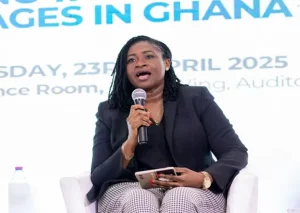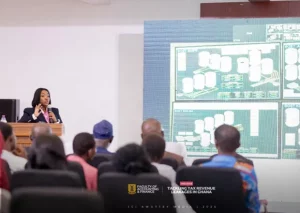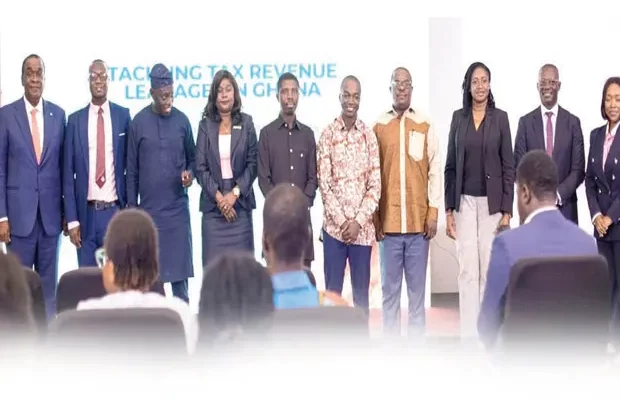Speakers at the conference
Experts at the University of Professional Studies, Accra (UPSA) tax dialogue have called for urgent improvements to Ghana’s tax system, highlighting the critical role of technology in addressing long-standing revenue leakages.
The dialogue dubbed: “Tackling Tax Revenue Leakages in Ghana” was hosted by the Faculty of Accounting and Finance at the UPSA.
The session, comprising academics and industry professionals, argued that Ghana’s persistent shortfalls in tax revenue mobilisation stem largely from the country’s failure to integrate its large informal sector into the formal tax net, weak enforcement capacity, and entrenched elite interests.
“We have an informal economy that is not being taxed directly. The lack of an integrated tax system makes it difficult to bring these actors into the revenue fold,” said Manager of Business Tax Advisory at Ernst & Young, Abigail Maame Esi Mensah.
She decried practices such as related-party transactions and transfer mispricing among large firms, which she said further erode the tax base.
Technological innovations, particularly the integration of the Ghana Card with the Tax Identification Number (TIN), were identified as important steps towards building a more inclusive and effective tax system.
However, she stressed that more is needed to be done to achieve meaningful results. “Technology has been a game-changer, but we are only scratching the surface,” Senior Lecturer at the University of Ghana’s Department of Economics, Dr. Priscilla Twumasi Baffuor, said.
She argued that while Ghana is a resource-rich nation, it has been unable to properly tax the resources that it generates. The economist, however, said it was exciting to see the innovation that is occurring within the space, but warned, “The reality remains: the human interface is the major issue we must address.”
She noted that the current system, which relies heavily on face-to-face interactions between taxpayers and tax agents, creates opportunities for negotiation, kickbacks, and systemic corruption. “When you remove the human interface, you improve the gains that have been made. Technology must be leveraged to reduce the cost of tax collection and improve transparency,” Dr. Twumasi added.
Property taxation was also highlighted as an underexploited avenue to broaden the tax base, particularly as a means to capture participants from the informal sector. With urban areas witnessing a boom in high-end developments, panelists suggested that digitised property databases and automated billing could significantly boost local government revenues.
The importance of tax education was underscored as a necessary complement to technological reforms. Without an improved understanding of the link between tax compliance and the provision of social goods, panelists warned that resistance to paying taxes would persist.
A specialist in mining governance at the Kwame Nkrumah University of Science and Technology (KNUST), Dr. Richard Boso, pointed to deeper cultural issues that continue to undermine the integrity of the tax system. “There is a misplaced sense of community which, in practice, often leads to corruption,” he said.
Dr. Boso further warned that technological solutions alone would not be sufficient unless the broader political economy was addressed. “One of the biggest problems we have in this country, and it cuts across all sectors, is that the country has been captured by the elite,” he said. “The issues discussed here are not unknown to those in power. If the political elite were serious about reform, they would not be questioning how long a company like Strategic Mobilisation Ghana Ltd (SML) has been operating. If someone brings a solution today, it should not matter whether they have been around for two days or two decades,” he added.
Dr. Boso’s comments comes as concerns have been raised about the influence of certain actors on SML. The petroleum sector revenue assurance debate has intensified with allegations that industry players benefiting from previous tax leakages are orchestrating opposition against SML.
SML, which provides real-time monitoring and auditing services for the Ghana Revenue Authority, has faced persistent criticism despite helping address substantial revenue losses. Before SML’s implementation, approximately 2.36 billion liters of petroleum products went untaxed in 2019 alone, resulting in estimated revenue losses of GH¢3.4 billion or roughly GH¢283 million monthly.
Dean of the Faculty of Accounting and Finance at UPSA, Professor Isaac Boadi, whose presentation at the dialogue highlighted annual losses of up to GH¢9 billion through corruption and tax evasion, had argued in a commentary earlier this year that oil cartels could be behind the attacks on SML. He noted that the Parliamentary Energy Committee had identified SML’s systems as disrupting a “well-entrenched network” of illicit actors.
Despite institutional backing—including a 306-page KPMG audit commissioned by President Nana Addo Dankwa Akufo-Addo that found no financial misconduct by SML—opposition has continued.
Director of Support Services at SML Ghana, Dr. Yaa Serwaa Sarpong, offered a preview of the company’s upstream monitoring capabilities during the same event. She said the system replicates the downstream monitoring architecture and provides the Ghana Revenue Authority and other state agencies with real-time insight into crude oil production and offtake volumes. “In real-time, Ghana will be able to know exactly what is going on upstream. We know how much petroleum products, how much that has been extracted and sold, and is being taken offshore,” she said.
The dialogue forms part of broader efforts by the UPSA Faculty of Accounting and Finance to stimulate informed debate on addressing Ghana’s revenue mobilisation challenges.
Other speakers at the conference were Dr. Eric Boachie Yiadom, Lead Consultant-GreenVista and Senior Lecturer, UPSA; Professor Douglas Boateng, Africa’s first-ever Professor Extraordinaire for Supply and Value Chain Management and Founder of PanAvest International; Dr. Charles Gyamfi Ofori, Policy Lead, Climate Change and Energy Transition, Africa Centre for Energy Policy; Abigail Maame Esi Mensah, Manager, Business Tax Advisory, Sub-Service Line of Ernst & Young, and several others.

Dr. Priscilla Twumasi Baffuor, Senior Lecturer, Department of Economics, University of Ghana

Dr. Yaa Serwaa Sarpong, Director of Support Services, SML Ghana


